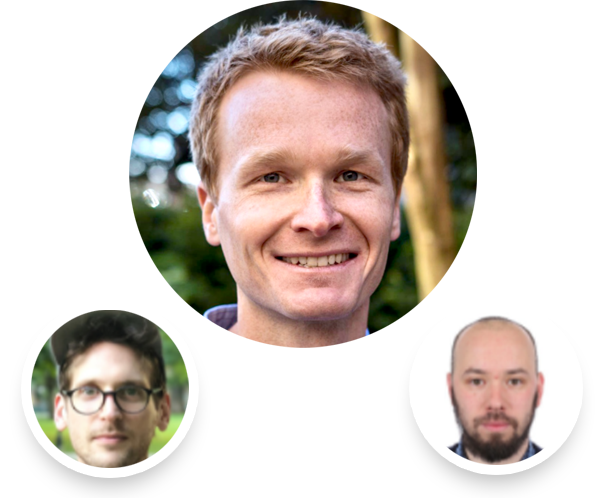
Here at CloudResearch, we value innovative and impactful research, and are pleased to offer a grant program to support research across various fields. Our grant covers the cost of participant payment and fees on CloudResearch’s Connect platform, helping researchers collect high-quality data for their studies. Grant applications are short and simple, asking researchers to explain the theoretical rationale for their study, who they are targeting, what materials they plan to use, and how their research is innovative and impactful. Click here to receive a notification when the submissions for the next round of funding is open.
Past CloudResearch Grant Recipients
2024

Reeham R. Mohammed
Adjunct Faculty at the University of Nevada, Reno
Attitudes, Values, and Beliefs about Israeli-Palestinian Conflict: A Contrapuntal Analysis of Oppositional Interview Data from United States Residents

Shilat Haim-Nachum
Postdoctoral Research Fellow at Columbia University & the New York State Psychiatric Institute
Jewish American Mental Health Following October 7: The Role of Antisemitism, Jewish Identity, and Intergenerational Trauma

Aaron Pomera
Postdoctoral Research Fellow at Rice University
Simplistic Perceptions of Power Dynamics as an Antecedent of Antisemitism

Aeleah Granger
Postdoctoral Research Collaborator at Portland State University
When Semantics Matter: The Effects of Language on Islamophobia, Antisemitism, and Perceptions of the Israel-Palestine War

Andrea Soledad Matos Devesa
Postdoctoral Research Fellow at The Chinese University of Hong Kong
Trust in Media, Radicalism, and their Roles in Islamophobia and Antisemitism

Ashley Fox
Associate Professor at the University at Albany
Islamophobia, anti-Semitism or Strategic Alliances? What is driving American attitudes towards the Israel-Palestine Conflict

Emily Gerdin
Research Fellow/PhD Candidate in Psychology at More in Common US/Yale University
How changing definitions affect attitudes toward antisemitism in America

Jake Womick
Assistant Professor at California State University Bakersfield
Villains and victims in the Middle East: Understanding the relationship between authoritarianism, Islamophobia, and antisemitism using moral typecasting theory.

Jamie Katz
PhD student at Arizona State University
The Emotions Driving Antisemitism and Islamophobia

Jareef Martuza
PhD Research Scholar at the Norwegian School of Economics
Behavioral Evidence on Antisemitism and Islamophobia

Nikhila Udupa
Graduate Student Researcher at Florida State University
Anger, internalizing distress, and coping strategies in the face of increasing antisemitism and Islamophobia: A mixed-methods approach to discrimination research

Daryl Van Tongeren
Associate Professor and Director of Frost Center for Social Science Research at Hope College
Antisemitism across the political spectrum: Do left-wing authoritarianism and right-wing authoritarianism differentially predict prejudice against Jewish individuals?

Jonathan Lane
Associate Professor at Vanderbilt University
The Emotions Driving Antisemitism and Islamophobia

Joseph Wagoner
Postdoctoral Research Associate at the University of Colorado, Colorado Springs
Incongruent Social Media Posts, Moral Attributions, and Prejudice Reduction: An Experimental Investigation

Kimberly Rios
Professor at the University of Illinois Urbana-Champaign
Do Jewish Americans Identify as White? Consequences for Anti-Semitism
2023

Ashley Sylvara
Doctoral Student at Kansas State University
Ashley is examining the use of artificial intelligence (AI) chatbots to detect when faking on personality tests in the context of job applications.

Benjamin Kaveladze
Graduate Student at the University of California, Irvine
Benjamin is testing 20 different SSIs (Single Session Interventions) to see which are most effective in improving participants’ mental health outcomes.

Brad Huang
Doctoral Student at the University of British Columbia
Brad is focusing on finding the sweet spot for creativity in human-AI collaborations, hypothesizing that too much or too little collaboration can be detrimental.

Kiana Sabugo
Research Assistant at UC Santa Barbara
Kiana is using a novel approach to manipulate perceptions of free will to better understand how beliefs about free will can be shaped and influenced by our everyday experiences of thought.
2022

Aslı Ceren Çınar
PhD Candidate in Political Science, The London School of Economics and Political Science (LSE)
Asli Ceren Çınar uses computer generated videos assessing how voters’ perceptions of candidates depend on candidate age, gender, race, attractiveness, and vocal pitch–attempting to combat sexism and racism in politics.

Farnoush Reshadi
Assistant Professor of Marketing, Worcester Polytechnic Institute
Farnoush Reshadi works on creating open ended attention checks that can be scored automatically using LIWC’s sentiment analysis.

Gilad Feldman
Assistant Professor, University of Hong Kong
Gilad Feldman is heading an ongoing replication project with a large team of Open Science early career researchers, working to create a more replicable and impactful science.

Yefim Roth
Lecturer, The University of Haifa
Yefim Roth compares the attentiveness of CloudResearch participants to the attentiveness of participants in the lab, helping further elucidate the differences and similarities between the two samples.
2021

Art Marsden
Syracuse University
Art Marsden is creating a free face database for researchers using StyleGAN 2 to generate images of realistic looking faces that are racially and ethnically diverse.

Michiel Spapé
University of Helsinki
Michiel Spapé is using innovative tools to explore the relationship between mood, motion, and time perception.

Nick Byrd
Stevens Institute of Technology
(team: Simon Cullen & Philipp Chapkovski)
Nick Byrd is building the Socrates Platform to allow real-time discussion between participants in psychology experiments.

Megan Burns
New York University
Megan Burns is investigating racial discrimination in the context of venture capitalism, using participants with a background in business to target people regularly involved in funding decisions.